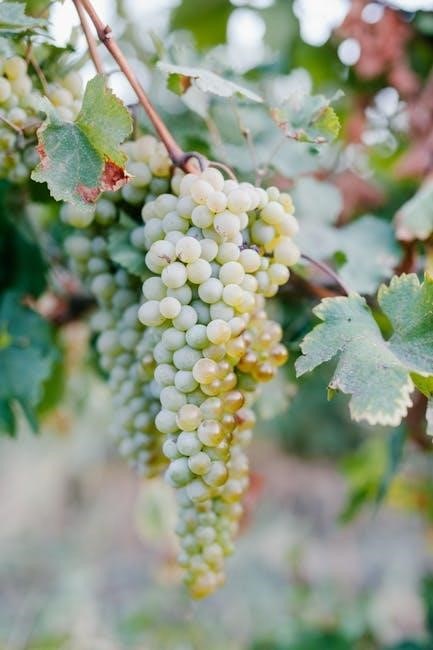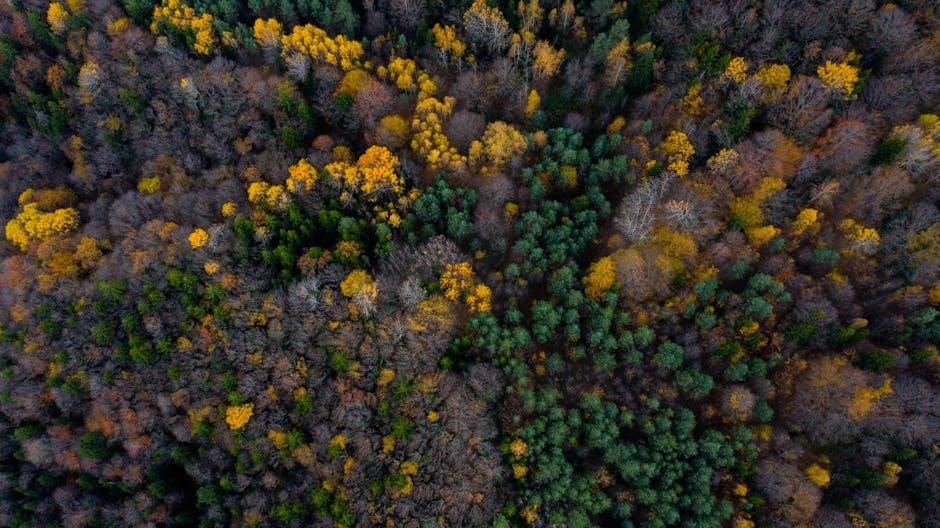The Georgia Dove Season 2024-2025 promises exciting opportunities for hunters․ The Georgia DNR provides essential details in their downloadable PDF guide, ensuring a well-prepared hunting experience․ With three distinct segments and clear regulations, hunters can enjoy a structured and sustainable season while adhering to conservation practices and safety guidelines․
Overview of Dove Hunting in Georgia
Dove hunting in Georgia is a popular outdoor activity, attracting hunters statewide․ The Georgia Department of Natural Resources (DNR) provides a comprehensive guide to ensure a successful and regulated season․ Hunters can expect a structured framework with specific segments, bag limits, and safety guidelines․ The season is designed to balance recreational opportunities with conservation efforts, making it essential for participants to adhere to regulations․ This overview highlights the key aspects of dove hunting in Georgia, preparing hunters for an enjoyable and sustainable experience during the 2024-2025 season․

Importance of the Georgia DNR PDF Guide
The Georgia DNR PDF guide is a vital resource for hunters, offering detailed information on 2024-2025 dove season dates, regulations, and licensing requirements․ It provides clarity on bag limits, firearms restrictions, and legal hunting areas, ensuring compliance with state laws․ The guide also includes safety tips and conservation practices, promoting sustainable hunting․ By referencing this guide, hunters can prepare effectively, understand their responsibilities, and make the most of their hunting experience in Georgia․

Key Dates for Dove Season 2024-2025
Georgia’s 2024-2025 dove season begins on September 7, with three segments: September 7–October 13, November 23–December 1, and December 19–January 31․ Statewide shooting hours apply, as detailed in the Georgia DNR guide․
September 7 ⏤ October 13: First Segment
The first segment of Georgia’s 2024-2025 dove season begins on September 7 and runs through October 13․ Hunters should be aware of bag limits and shooting hours, which are detailed in the Georgia DNR guide․ This period offers prime opportunities for dove hunting across the state, with active flight patterns during early fall․ Ensure compliance with all regulations, including firearm restrictions and habitat conservation practices․ This segment is ideal for experienced hunters and newcomers alike, providing a dynamic start to the season․ Plan accordingly to make the most of this period․

November 23 ─ December 1: Second Segment
The second segment of Georgia’s dove season runs from November 23 to December 1․ This period offers a shorter but intense hunting window, with cooler weather often enhancing bird activity․ Hunters must adhere to the daily bag limit of 15 birds and other specified regulations․ This segment is particularly popular as it coincides with the Thanksgiving holiday, allowing hunters to combine traditional activities with their passion for dove hunting․ Utilize the Georgia DNR guide for detailed insights to maximize this opportunity effectively and responsibly․
December 19 ⏤ January 31: Third Segment
The third segment of Georgia’s dove season spans from December 19 to January 31, offering a lengthy hunting period․ This final phase coincides with cooler winter conditions, which can impact bird behavior and concentrations․ Hunters must remain mindful of the 15-bird daily bag limit and adhere to all firearms regulations․ While dove numbers may be lower due to migration patterns, the extended season provides ample opportunities for those willing to adapt strategies․ Consult the Georgia DNR guide for specific rules and insights to make the most of this season’s conclusion․
Bag Limits and Regulations
Georgia’s dove season enforces a daily bag limit of 15 birds, ensuring sustainable hunting practices․ Specific firearm restrictions, such as no centerfire rifles for small game, apply during the season․ Compliance with all regulations is essential for conservation efforts and hunter responsibility․

Daily Bag Limit: 15 Birds
The Georgia DNR has established a daily bag limit of 15 birds for dove hunting during the 2024-2025 season․ This limit applies to mourning doves and white-winged doves combined, with no more than 10 being white-winged doves․ Hunters must ensure they do not exceed this limit to comply with state regulations․ The bag limit is designed to promote sustainable hunting practices and maintain healthy dove populations․ Adhering to these limits is crucial for conservation efforts and ensures fair opportunities for all hunters throughout the season․ Proper documentation and identification of harvested birds are also recommended to avoid any legal issues․
Firearms Restrictions for Dove Hunting
Firearms used for dove hunting in Georgia must adhere to specific regulations․ Shotguns with a capacity of no more than three shells are permitted, and non-toxic shot is required․ Centerfire rifles are prohibited for dove hunting on Wildlife Management Areas (WMAs)․ Hunters must ensure their firearms comply with state and federal laws to avoid penalties․ Always consult the Georgia DNR guide for the most accurate and updated information on firearm restrictions to ensure a legal and safe hunting experience during the 2024-2025 season․ Proper adherence to these rules is essential for conservation and hunter safety․
Licensing Requirements
A valid hunting license is required for dove hunting in Georgia․ Licenses are available for both residents and non-residents․ Purchase online or in-person through Georgia DNR-approved vendors․
Hunting License Types
Georgia offers various hunting licenses to accommodate different needs․ Resident and non-resident licenses are available, with options for annual and short-term permits․ Youth hunters aged 12-17 require a license, while seniors may qualify for discounted rates․ A migratory bird stamp is mandatory for dove hunting, ensuring compliance with federal regulations․ Licenses can be purchased online or at local vendors, making it convenient for hunters to obtain the necessary permits before the season begins․ Proper licensing ensures legal and sustainable hunting practices․
Where to Purchase Licenses
Hunting licenses for the Georgia Dove Season can be purchased online through the Georgia DNR website or at local vendors․ Retail stores like Walmart and Academy Sports typically carry licenses, as do DNR field offices․ A valid government-issued ID and proof of residency are required․ Online purchases offer convenience, with licenses available 24/7․ Ensure to have all necessary documentation ready to complete the process efficiently․ Purchasing a license supports wildlife conservation and ensures compliance with state hunting regulations․
Where to Hunt
Georgia offers diverse hunting locations, including public lands and Wildlife Management Areas managed by the DNR․ Private lands require landowner permission for access and hunting privileges․
Public Lands and Wildlife Management Areas
Georgia’s public lands and Wildlife Management Areas (WMAs) offer prime locations for dove hunting․ Managed by the Georgia DNR, these areas provide accessible and well-maintained spaces for hunters․ WMAs like those near Albany are popular spots, offering diverse habitats that attract dove populations․ Hunters must adhere to specific rules, such as permit requirements and restricted hunting hours․ The Georgia DNR website provides detailed maps and access information for these public hunting grounds, ensuring a smooth and enjoyable experience for participants․
Private Lands: Permissions and Etiquette
Hunting on private lands in Georgia requires explicit permission from landowners․ Securing access involves building trust through clear communication and respecting property rights․ Hunters should inquire about specific rules, such as access hours or equipment restrictions․ Demonstrating courtesy, like closing gates and removing trash, fosters positive relationships․ The Georgia DNR emphasizes the importance of landowner-hunter etiquette to ensure sustainable hunting practices and continued access to private properties for future seasons․

Safety Tips and Best Practices
Always wear blaze orange for visibility and use ear and eye protection․ Be aware of surroundings and other hunters․ Follow firearms safety guidelines to ensure a safe experience․
General Hunting Safety Guidelines
Always wear blaze orange clothing for visibility to other hunters․ Use ear and eye protection to safeguard against firearms noise and debris․ Be aware of your surroundings and ensure clear communication with hunting partners․ Handle firearms safely, keeping them unloaded when not in use․ Familiarize yourself with the terrain to avoid accidents․ Respect private property and follow all posted signs․ Ensure all hunting licenses and permits are up to date․ Adhere to local regulations and hunting hours for a safe and legal experience․ Consult the Georgia DNR guide for detailed safety protocols․
Specific Safety Tips for Dove Hunting
When dove hunting, always know your surroundings and avoid fields with bystanders or livestock․ Use non-toxic shot to protect the environment; Stay alert for other hunters and wear blaze orange for visibility․ Be mindful of hunting hours and adhere to legal shooting times․ Avoid hunting near power lines or other hazards․ Ensure all firearms are handled safely and never point them at non-target species․ Familiarize yourself with the field layout to avoid accidents․ Follow the Georgia DNR guidelines for a safe and responsible hunting experience․

Environmental Considerations
Georgia’s dove season emphasizes sustainable hunting practices․ The Georgia DNR guide highlights the importance of non-toxic shot and habitat conservation to protect dove populations and ecosystems․
Habitat Conservation for Doves

Habitat conservation is vital for maintaining healthy dove populations․ The Georgia DNR emphasizes preserving open fields, grasslands, and woodlands, which are critical for nesting and feeding․ Protecting these areas ensures doves have ample food sources and breeding grounds․ Hunters and landowners are encouraged to adopt sustainable practices, such as delayed mowing and planting dove-friendly crops․ These efforts help maintain biodiversity and support the long-term sustainability of dove populations in Georgia․
Impact of Hunting on Wildlife Populations
Hunting plays a significant role in managing wildlife populations by maintaining ecological balance․ In Georgia, regulated dove hunting helps control population growth, preventing overgrazing and habitat degradation․ The Georgia DNR ensures that hunting practices are sustainable, with bag limits and season dates designed to protect dove populations․ Hunting also supports conservation efforts by generating revenue for wildlife management programs, which enhance habitats and ensure the survival of diverse species․ This balance between hunting and conservation fosters a healthy ecosystem for future generations․

